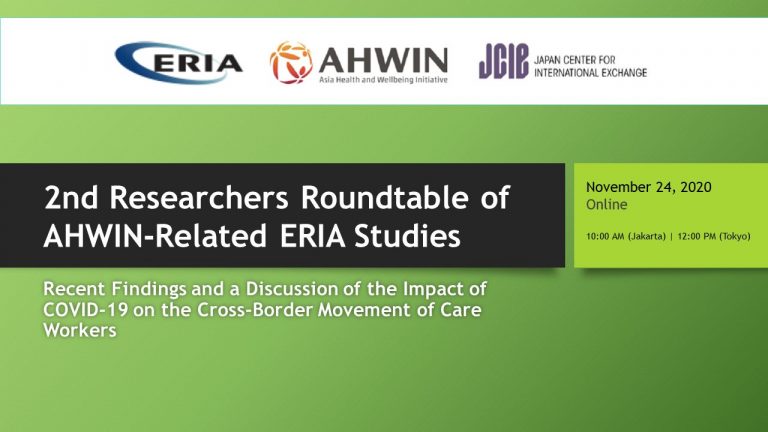As a follow up to the 2019 roundtable for researchers involved in AHWIN-related ERIA studies, the Japan Center for International Exchange (JCIE) and the Economic Research Institute for ASEAN and East Asia (ERIA) partnered once again to build on the network of AHWIN-supported experts. This online meeting, which focused on projects addressing the cross-border movement of the long-term care workforce, gave researchers the opportunity to present their studies to allow for information-sharing, cross-pollination, and networking among the various research teams.
The second half of the event focused on the impact of COVID-19 on the recruitment, training, and work of migrant healthcare and eldercare workers, where speakers addressed some of the major challenges created by travel restrictions in the wake of the pandemic.
Here are some of the many key takeaways from the discussions:
- During the COVID-19 pandemic, the safety and security of migrant workers in the healthcare and eldercare sectors has become a critical issue, which needs to be considered by the countries both receiving and sending such workers.
- The governments of sending countries such as Indonesia and the Philippines have become increasingly strict about how they deploy migrant workers abroad.
- Job categorization and providing social recognition to trained care workers has been a persisting dilemma for ASEAN countries.
- The terminology used to describe those working with older people differs by country. For example, based on its economic partnership agreements, Japan uses the term “certified care worker” to describe “kaigo-fukushishi”. However, despite the similarity of their actual work activities, Indonesia calls such workers “caregivers.”
- Countries such as Malaysia have developed qualification programs to provide professional training for care workers but face the problem that the programs are not tied to a proper payment system. Employers are reluctant to cover the training fees for employees and this results in an inadequately trained care workforce.
- Harmonizing the qualification framework for professional long-term care workers could contribute to the optimization and maximization of the skills and knowledge of care workers.
- ASEAN member countries have a responsibility to develop their own qualification standards and to cooperate with other member states to move the ASEAN standard forward.

AGENDA AND PRESENTATION SLIDES
WELCOMING REMARKS
Satoko Itoh, Managing Director, JCIE
SESSION 1: Research Presentations
Moderator:
Osuke Komazawa, Special Advisor on Healthcare & Long-Term Care Policy, ERIA
Human Resources for Health and Elderly Care in Asia
Maria Reinaruth D. Carlos, Faculty of International Studies, Ryukoku University, Japan (Presentation)
The Skill Circulation of Oral Care and Swallowing Function Rehabilitation: Developing a Career Path for Returned Healthcare Migrants from Japan to Asian Countries
Susiana Nugraha, Universitas Respati Indonesia (Presentation)
Modeling the Development and Circulation of the Long-Term Care Workforce
Takeo Ogawa, President, Asian Aging Business Center; Professor Emeritus, Kyushu University (Presentation)
SESSION 2: Discussion on the Impact of COVID-19 on the Recruitment, Training, and Work of Cross-Border Migrant Healthcare and Eldercare Workers
Moderator:
Yuko Hirano, Professor, Institute of Biomedical Sciences, Nagasaki University
Ines Yamanouchi Mallari, President and School Administrator, Mindanao Kokusai Daigaku (Presentation)
Mita Noveria, Researcher, Research Center for Population – Indonesian Institute of Sciences (PPK-LIPI) (Presentation)
Yoichi Hiruma, Associate Professor, Organization for International Collaboration, Shizuoka University

